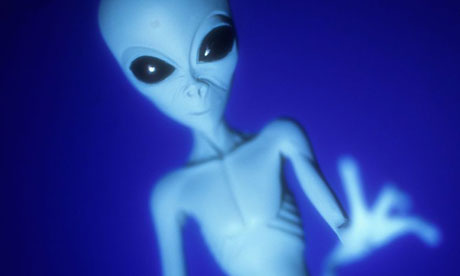Extra-terrestrials likely to possess human foibles such as greed, violence and a tendency to exploit others' resources, conference to be told

Alien visitors to Earth may be as acquisitive as humans. Photograph: Getty
Governments should prepare for the worst if aliens visit Earth because beings from outer space are likely to be just like humans, a leading scientist is claiming.
Extra-terrestrials might not only resemble us but have our foibles, such as greed, violence and a tendency to exploit others' resources, says Simon Conway Morris, professor of evolutionary paleobiology at Cambridge University.
And while aliens could come in peace they are quite as likely to be searching for somewhere to live, and to help themselves to water, minerals and fuel, Conway Morris will tell a conference at the Royal Society in London tomorrow.
His lecture is part of a two-day conference at which experts will discuss how we might detect life on distant planets and what that could mean for society. "Extra-terrestrials … won't be splodges of glue … they could be disturbingly like us, and that might not be a good thing – we don't have a great record."
The US space agency's search for alien life is based upon the mantra "follow the water", a strategy reflecting the fact that, on Earth, where there's water there's life. Recent missions have revealed ice on the moon and Mars.
Astronomers have detected more than 400 planets outside our solar system, some of which sit in the "Goldilocks zone" where the temperature is neither too hot nor too cold for liquid water to form.
Conway Morris will argue that alien life is most likely to occur on a planet similar to our own, with organisms made from the same biochemicals. The process of evolution will even shape alien life in a similar way, he added.
"My view is that Darwinian evolution is really quite predictable, and when you have a biosphere and evolution takes over, then common themes emerge and the same is true for intelligence.
"If you have a planet much smaller than ours, the gravity is so weak it loses its atmosphere. If the planet is much bigger, its gravity is so strong that everything crawls around on the ground, because you don't have to fall far to break everything. It's fantastically dull."
The meeting is the first in a series that marks the Royal Society's 350th anniversary. Future conferences will tackle the science of ageing, vaccines, stem cells and geoengineering: the use of technology to protect the planet from the adverse effects of climate change.
Albert Harrison, a professor of psychology at the University of California, Davis, who is speaking at the meeting tomorrow, will raise concerns about the radio signals humans are sending out to any eavesdropping aliens.
Scientists have used telescopes to listen for alien broadcasts for more than 20 years, but we have also beamed our own signals into space. Harrison wonders if we might be sending the wrong kind of messages.
"Some of them are serious, but there's a lot of hoopla, like love letters and commercials. What would we make of an alien civilisation if the first thing we translated from them was a commercial for a snack food?" he said.
In the spring, scientists will debate whether Earth should be more proactive in trying to make contact with aliens by broadcasting signals to solar systems that might harbour life.
Some enthusiasts believe any alien civilisation capable of reaching us can only have survived long enough to develop the necessary technology by solving major social problems, such as war, poverty and discrimination. Harrison disagrees.
"I do think there's a risk in active searches for extra-terrestrials. The attitude seems to be they're friendly, they're a long way away, and they can't get here. But if you wake up one morning and an armada of extra-terrestrial spaceships are circling Earth, that prediction won't necessarily hold," Harrison said.
If life has evolved elsewhere in our cosmic neighbourhood, we should find out by detecting their waste gases in the atmosphere of their planet or by discovering remnants of extra-terrestrial microbes in meteorites or alien soil samples, he said.
Harrison dismisses fears of public panic if alien life is discovered, of the kind which reportedly followed Orson Welles' infamous radio broadcast of War of the Worlds in 1938.
"The public reaction was overstated. Most people who thought the broadcast was real took sensible actions to protect themselves," Harrison said. "Surveys suggest most people think they will be fine, but they worry about others freaking out."
Ted Peters, professor of systematic theology at the Pacific Lutheran Theological Seminary in California, has surveyed religious groups to understand whether confirmation of extra-terrestrials could trigger the collapse of religion on Earth.
His research suggests not, but he believes Christians should clarify whether God's creation covers the whole of space or just Earth.